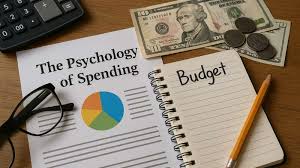The Psychology Behind Sticking To Your Budget: Insights And Strategies.

How psychology behind sticking to your budget influences your financial success. Explore emotional triggers & strategies to stay on track.
Understanding the psychology behind sticking to your budget can significantly impact your financial success. While most of us know we should save more and spend less, following through is often harder than expected. That’s because our financial decisions are deeply tied to our emotions, habits, and cognitive patterns. This blog post will explore these psychological mechanisms and offer effective strategies to help you maintain your budget. By delving into the reasons behind our financial decisions, we can better equip ourselves to make positive changes and achieve our financial goals.

1. The Role of Emotions in Financial Decision-Making
Money is emotional. Whether it’s the thrill of buying something new or the stress of unpaid bills, emotions can have a powerful impact on how we manage (or mismanage) our finances.
Many impulse purchases happen not because we need something, but because we’re trying to soothe feelings like boredom, stress, or even low self-worth. Emotional spending can create short-term satisfaction but often leads to long-term regret and financial strain.
2. The Impact of Cognitive Biases on Budgeting
Our brains are wired with cognitive shortcuts called biases—that can lead to poor financial decisions without us even realizing it.
- Optimism bias makes us underestimate future expenses or overestimate our ability to stick to the budget.
- Loss aversion causes us to fear missing out or feel the pain of budgeting more than the benefits of saving.
These biases can sabotage even the most well-planned budgets.
Tip: Build self-awareness around these biases. For example, instead of saying “I’ll cut my dining-out budget in half,” try, “I’ll plan to dine out twice a week and track it.” Framing goals more concretely can help you overcome unrealistic expectations.
Tip: Start tracking your emotional state when you make spending decisions. Are you tired, anxious, or celebrating something? Identifying emotional triggers can help you pause and make more intentional choices.
3. Strategies for Sticking to Your Budget
Understanding the psychology is just the first step, now it’s time to put practical tools into place.
- Set realistic goals: Don’t aim for perfection. Start with small, achievable steps and scale up as you build confidence.
- Track your expenses: Use budgeting apps or simple spreadsheets to stay aware of your spending patterns.
- Create accountability: Share your goals with a friend, partner, or financial coach who can support and motivate you.
Consistency beats intensity. It’s not about how perfectly you budget, it’s about showing up for your finances every day.
4. The Importance of Mindset and Motivation
Mindset matters. People who succeed with budgeting often believe that their efforts will pay off and that they’re capable of change, even if they’ve failed before.
A growth mindset helps you view budgeting setbacks as learning opportunities, not proof that you’re “bad with money.” Combine this with intrinsic motivation such as the desire to feel secure or provide for your family and you’ll have a powerful foundation for lasting change.
Tip: Visualize your “why.” Whether it’s traveling, owning a home, or retiring early, keeping your goals front and center can fuel your motivation during tough times.
Budgeting Is About More Than Numbers
In conclusion, the psychology behind sticking to your budget is a critical (and often overlooked) part of financial success. By recognizing the emotional and cognitive forces at play, you can build better habits, develop a healthier relationship with money, and make budgeting a sustainable practice.
Remember: your budget is not a punishment, it’s a tool for freedom. The more you understand your financial behavior, the more empowered you’ll be to shape your future.
Ready to Take Control of Your Finances
Understanding the psychology behind your money habits is just the beginning. If you're ready to create a personalized budget, overcome emotional spending, and build financial confidence, I’m here to help.
Book a 1:1 coaching session today and start turning your financial goals into reality.
Let’s work together to build a budgeting plan that actually sticks, because you deserve financial peace of mind.
 Dr. Brandy Baxter
Dr. Brandy Baxter 